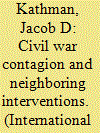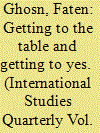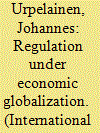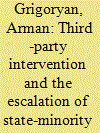|
|
|
Sort Order |
|
|
|
Items / Page
|
|
|
|
|
|
|
| Srl | Item |
| 1 |
ID:
101615


|
|
|
|
|
| Publication |
2010.
|
| Summary/Abstract |
Extant models of civil war intervention have difficulty accounting for the intervention decisions of third-party states that share a border with an ongoing civil war. This is troubling, as contiguous third parties account for a large proportion of interventions. I demonstrate that the tendency of civil wars to spread geographically pose neighbor states with threats to their well-being that are faced by no other type of intervener in the international system. Destruction, regime stability, even state survival are threatened by the prospect of civil war infection. I argue that neighboring third parties are thus motivated to intervene in an attempt to thwart war diffusion across their own borders. Through an analysis of civil war prevalence, I generate a measure of each state's yearly likelihood of being infected by a proximate civil war's hostilities. I then use this measure to explain neighboring interventions in civil wars of the post-WWII period. The results support my theorized expectations.
|
|
|
|
|
|
|
|
|
|
|
|
|
|
|
|
| 2 |
ID:
101613


|
|
|
|
|
| Publication |
2010.
|
| Summary/Abstract |
Human rights prosecutions have been the major policy innovation of the late twentieth century designed to address human rights violations. The main justification for such prosecutions is that sanctions are necessary to deter future violations. In this article, we use our new data set on domestic and international human rights prosecutions in 100 transitional countries to explore whether prosecuting human rights violations can decrease repression. We find that human rights prosecutions after transition lead to improvements in human rights protection, and that human rights prosecutions have a deterrence impact beyond the confines of the single country. We also explore the mechanisms through which prosecutions lead to improvements in human rights. We argue that impact of prosecutions is the result of both normative pressures and material punishment and provide support for this argument with a comparison of the impact of prosecutions and truth commissions, which do not involve material punishment.
|
|
|
|
|
|
|
|
|
|
|
|
|
|
|
|
| 3 |
ID:
101616


|
|
|
| 4 |
ID:
101618


|
|
|
|
|
| Publication |
2010.
|
| Summary/Abstract |
This paper analyzes the conditions that encourage (or hinder) conflicting states in coming to the negotiating table. It also explores the factors that influence the successfulness of such negotiation attempts. A main argument of the paper is that it is important to look at what brings states to the table, because this may have a direct or indirect impact on the outcome of such negotiations. While confirming some of the findings within the conflict management literature, this paper demonstrates that contextual factors seem to have different effects or a different impact on each stage, implying that while certain factors may bring states to the table, they may not be the same factors that make agreements possible.
|
|
|
|
|
|
|
|
|
|
|
|
|
|
|
|
| 5 |
ID:
101614


|
|
|
|
|
| Publication |
2010.
|
| Summary/Abstract |
Past studies examining the international conflict behavior of parliamentary democracies have reported inconsistent findings and produced some empirical puzzles. One of the main puzzles is that, despite a strong theoretical basis for expecting coalitional majority cabinets to be less conflict prone than single-party majorities, most studies found no difference in their conflict behavior. Still others report coalitional governments to be more conflict prone than single-party ones. In this study, I show that these empirical inconsistencies can be resolved once we take into account the ideological composition of the cabinet. The main contention is that relatively marginal coalitional partners may have a disproportionate influence when the government faces risky decisions, such as the initiation of international disputes. The key lies in their greater bargaining leverage in intra-coalitional politics, which is subsequently reflected in their influence over foreign conflict decisions. More generally, this study shows how different degrees of ideological diversity or cohesion abate and/or accentuate a state's conflict behavior. The expectations are tested empirically, and the findings more robustly predict the conflict behavior of parliamentary regimes than do the results of previous research.
|
|
|
|
|
|
|
|
|
|
|
|
|
|
|
|
| 6 |
ID:
101621


|
|
|
|
|
| Publication |
2010.
|
| Summary/Abstract |
We argue that international organizations decrease the duration of international conflicts by mitigating commitment problems and encouraging combatants to cease hostilities more quickly. Empirical analyses of militarized interstate dispute duration (1950-2000) reveal that increasing shared international organization (IO) participation reduces the length of disputes, even after accounting for selection into international conflict. We also find that international organizations designed to mitigate commitment problems decrease dispute duration, while IOs capable of reducing information asymmetries do not influence dispute length.
|
|
|
|
|
|
|
|
|
|
|
|
|
|
|
|
| 7 |
ID:
101623


|
|
|
|
|
| Publication |
2010.
|
| Summary/Abstract |
We examine the commitments of transnational corporations to human rights, labor, environmental, and anti-corruption standards. Modeling commitment as a function of the nature of the firm's business activities and conditioned by neighborhood and audience contexts, we investigate adherence to the principles entailed in the UN Global Compact program by the world's 2000 largest companies. Our results suggest that the decisions to participate in and to take steps to comply with the Global Compact are influenced by the characteristics of the firm as it adapts to its institutional and political environment. Signing up to the program increases the likelihood of firms developing human rights-related company policies and receiving positive external assessments of their performance.
|
|
|
|
|
|
|
|
|
|
|
|
|
|
|
|
| 8 |
ID:
101620


|
|
|
|
|
| Publication |
2010.
|
| Summary/Abstract |
How does economic globalization shape the regulations that states enact to control negative externalities? Previous research downplays the role of international cooperation and the present historical context, so it cannot offer a coherent theoretic account of the empirical record. I construct a formal model in which states can engage in regulatory cooperation to coordinate their policies. I prove three main results. First, a "race to the bottom" is unlikely because it requires non-cooperative adjustments by industrialized countries. Second, a partial "race to the top" is likely because many emerging countries stand to gain from reduced negative externalities and the competitiveness problem is limited when the most lucrative export markets are already regulated. Finally, powerful industrialized countries with a high regulatory capacity benefit from a global expansion of regulation.
|
|
|
|
|
|
|
|
|
|
|
|
|
|
|
|
| 9 |
ID:
101617


|
|
|
|
|
| Publication |
2010.
|
| Summary/Abstract |
Why does ethnic violence occur in some places but not others? This paper argues that the local ethnic configuration below the national level is an important determinant of how likely conflict is in any particular place. Existing studies of ethnicity and conflict focus on national-level fractionalization or dominance, but much of the politics surrounding ethnic groups' grievances and disputes takes place at a more local level. We argue that the existence of multiple ethnic groups competing for resources and power at the level of sub-national administrative regions creates a significant constraint on the ability of states to mitigate ethnic groups' grievances. This in turn increases the likelihood of conflict between ethnic groups and the state. In particular, we argue that diverse administrative regions dominated by one group should be most prone for conflict. Using new data on conflict and ethnic group composition at the region level, we test the theory and find that units with one demographically dominant ethnic group among multiple groups are most prone to conflict.
|
|
|
|
|
|
|
|
|
|
|
|
|
|
|
|
| 10 |
ID:
101619


|
|
|
|
|
| Publication |
2010.
|
| Summary/Abstract |
Issues remain at the core of armed conflict. Territory, in particular, appears to increase substantially the probability of inter-state violence and is concluded by many to be one of the most critical correlates of war onset. While scholars have called for an issue-based approach to the study of international relations for some time, recent data collection efforts allow the emergence and management of contentious issues over time to be studied more directly. Our argument and evidence suggest that territory is not necessarily contentious by itself, but is contentious in dyadic contexts characterized by rivalry. Using data from the Issue Correlates of War project, which codes specific government assertions of ownership to territory, river, and maritime locations, we find strategic rivalry, coupled with territorial claims, produces some of the most conflict-prone dyads. Further, jointly democratic domestic institutions do not appear to reduce the hazard of violent conflict over territorial issues within the context of rivalry, although they substantially reduce the hazard of violent conflict among states outside the context of rivalry.
|
|
|
|
|
|
|
|
|
|
|
|
|
|
|
|
| 11 |
ID:
101622


|
|
|
|
|
| Publication |
2010.
|
| Summary/Abstract |
This article addresses the problem of escalated violence against minorities induced by interventions. The conventional interventionist wisdom rejects the very possibility of such escalation, claiming that violence against minorities is a monotonically decreasing function of interventions and insisting that it is third-party inaction that is the problem. In recent years, this position has been challenged by scholars, who have argued that the threat of intervention generates a moral hazard, providing minorities with perverse incentives to provoke the very violence the threat of intervention is supposed to deter. I argue that while many of the criticisms of the interventionist position contained in this argument are correct, it is nonetheless not fully convincing, because it fails to explain why the same threat of intervention that radicalizes minorities does not make the states that are the potential targets that much more moderate. Nor does it explain adequately why interveners are unable to make the threat of intervention conditional on the minorities'"good" behavior. I propose an alternative theory of escalation, which depicts third-party interventions as instances of incomplete information bargaining, demonstrating that escalation is a function of certain distributions of private information about the target-state's level of brutality and the third party's resolve, as well as the third party's motives. The conflicts in Yugoslavia are used to illustrate and test the key implications of the model.
|
|
|
|
|
|
|
|
|
|
|
|
|
|
|
|
| 12 |
ID:
101612


|
|
|
|
|
| Publication |
2010.
|
| Summary/Abstract |
In this article, we seek to advance the theoretic and empirical literature on the diversionary use of force. We argue that state leaders are more likely to engage in diversionary foreign policy behavior when opposition groups from within the winning coalition press for policy changes, but the government rejects those policy demands. Only when domestic unrest threatens a loss of political support from groups that are politically important to the leadership do we expect leaders to try and rally their support through heightened international conflict. We test this argument in an analysis of Japanese foreign policy behavior from 1890 to 1941 regarding (i) the initiation of military threats, (ii) concessions in negotiations, and (iii) the escalation of military confrontations. Drawing upon new data sets collected on Japanese domestic politics and foreign relations, we find strong support for our argument in a series of statistical tests.
|
|
|
|
|
|
|
|
|
|
|
|
|
|
|
|
|
|
|
|
|